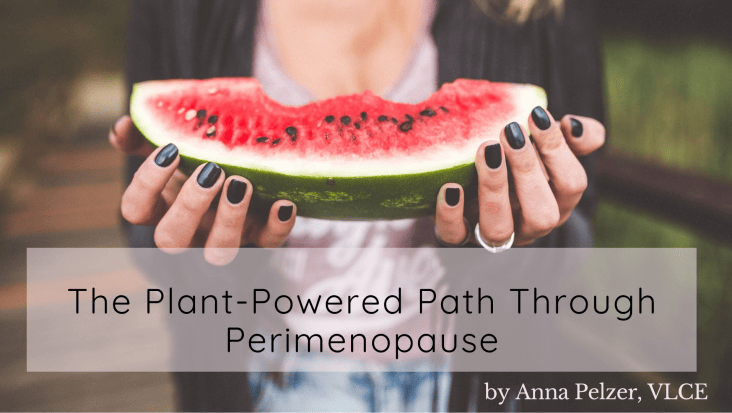posted January 9, 2024

Menopause is a transition half of the world’s population will experience. It can be difficult and stressful, with wildly fluctuating hormones, a host of unpleasant symptoms, and a sense of loss or anxiety around aging. This stage occurs when one year has passed since one’s last menstrual cycle. Natural menopause usually happens between the ages of 40 and 56, with an average age of 51. Menopause can also occur earlier for medical reasons, such as removal of the ovaries, chemotherapy, primary ovarian insufficiency, or malnutrition. The years (up to a decade) before menopause is known as perimenopause.
Perimenopause is a challenging time for many women, to put it mildly, even described as second puberty. Fluctuating estrogen levels can cause symptoms from head to toes, including mood changes, cycle irregularities, weight gain, insomnia, fatigue, skin changes, and hot flashes, to name a few. However, a whole food based vegan diet can be very helpful in managing these symptoms.
The Heart and Bones
Estrogen is protective for the heart and for the bones; thus, the decrease of estrogen associated with perimenopause can lead to negative changes in heart and bone health. In terms of cardiovascular health, vegans eating a whole food diet are at an advantage as they are not exposed to animal fats which can clog arteries.
As for bone health, a diet high in alkaline plant foods can prevent the loss of calcium. Leafy greens, such as parsley, collards, and kale, are alkalizing as well as high in calcium. Foods like chickpeas, almonds, and fortified plant milk are also good sources. Weight-bearing activity, such as walking or resistance training, is also necessary to build new bone.
Brain
Brain health can also be affected during perimenopause’s drop in estrogen. Women may experience brain fog as well as mood changes due to hormonal fluctuations. As the brain is made up of fatty tissue, healthy fats, like walnuts, avocados, and flaxseed oil, are vital for brain health.
Muscles, Energy, and Weight
At this stage in life, we often get less movement throughout the day than before—but are not necessarily less hungry. Hormonal changes, such as decreased oxytocin, may lead to cravings for more sweet or salty comfort foods. Muscle mass can drop with the drop in estrogen, which can decrease metabolism due to burning fewer calories at rest. However, the fiber in vegan foods can help as it keeps your energy levels steady, and you can also eat more without adding a lot of calories. Fiber also helps us stay satisfied longer, which can help with weight gain that is so common during perimenopause.
Thirst
As we age, we tend to lose our sense of thirst and become more dehydrated. This can bring about headaches, joint pain, skin issues, and affects urinary health. Fruits and vegetables are high in moisture, helping with hydration.
Antioxidants

A vegan diet also typically has lots of colorful fruits and vegetables which are high in antioxidants. This can help reduce tissue damage and inflammation.
Protein
A building block for our cells, protein becomes more important during perimenopause. We don’t absorb protein as well as we age, affecting hair, skin, nails, muscles, and bones. It also can lead to mood changes as certain amino acids from protein are used to make feel-good neurotransmitters like dopamine, melatonin, and serotonin. Insufficient protein can lead to fatigue and blood sugar crashes. At this stage in life, we may need to start consuming more vegan protein to meet our daily needs.
Hot Flashes
One popular vegan protein, soy, contains phytoestrogens. In 2021 the Women’s Study for the Alleviation of Vasomotor Symptoms (WAVS), conducted by Dr. Neal Barnard, showed that women eating a low fat, plant-based diet with half a cup of soybeans reduced hot flashes by 84%, without medications.
Stress

Stress is very common in perimenopause, correlated with hot flashes, fatigue, and loss of sleep. Meditation, mindfulness, and gentle exercise can help.
How to Improve Your Perimenopause Experience
Perimenopause can be frustrating. There may be symptoms that make you feel disconnected from or out of control of your body. However, there are many things that can be done to improve your experience:
- Eat a whole food based vegan diet
- Get sufficient protein, fiber, and healthy fats
- Stay hydrated
- Get some form of movement
- Reduce stress

Anna Pelzer is a Main Street Vegan Academy graduate and former vegan food photographer turned menopause coach and meditation instructor. She uses vegan nutrition, stress reduction, body awareness, and lifestyle practices to help women have a better experience through their transition to menopause. She is also the host of the Vegan Menopause Podcast.
Find Anna at Blissful Menopause, Instagram @anna.pelzer, and YouTube.

